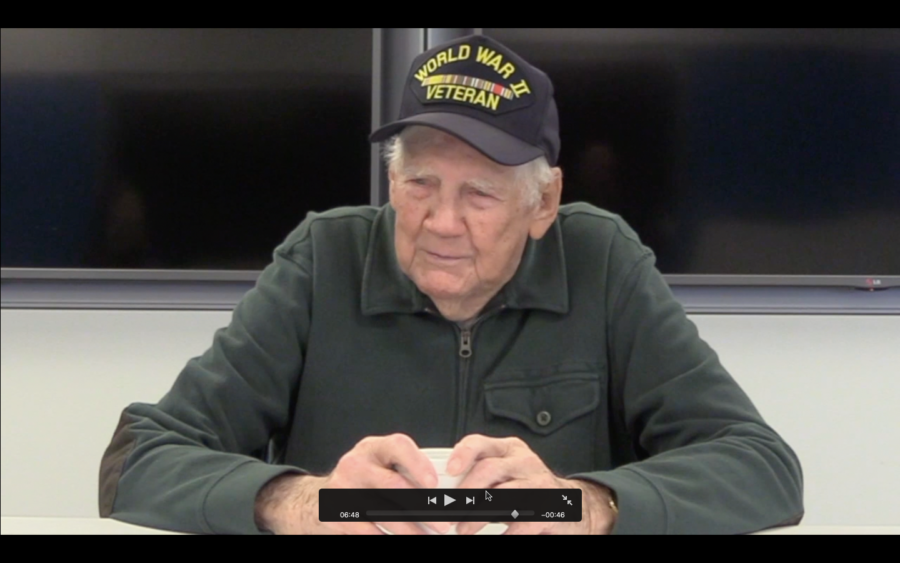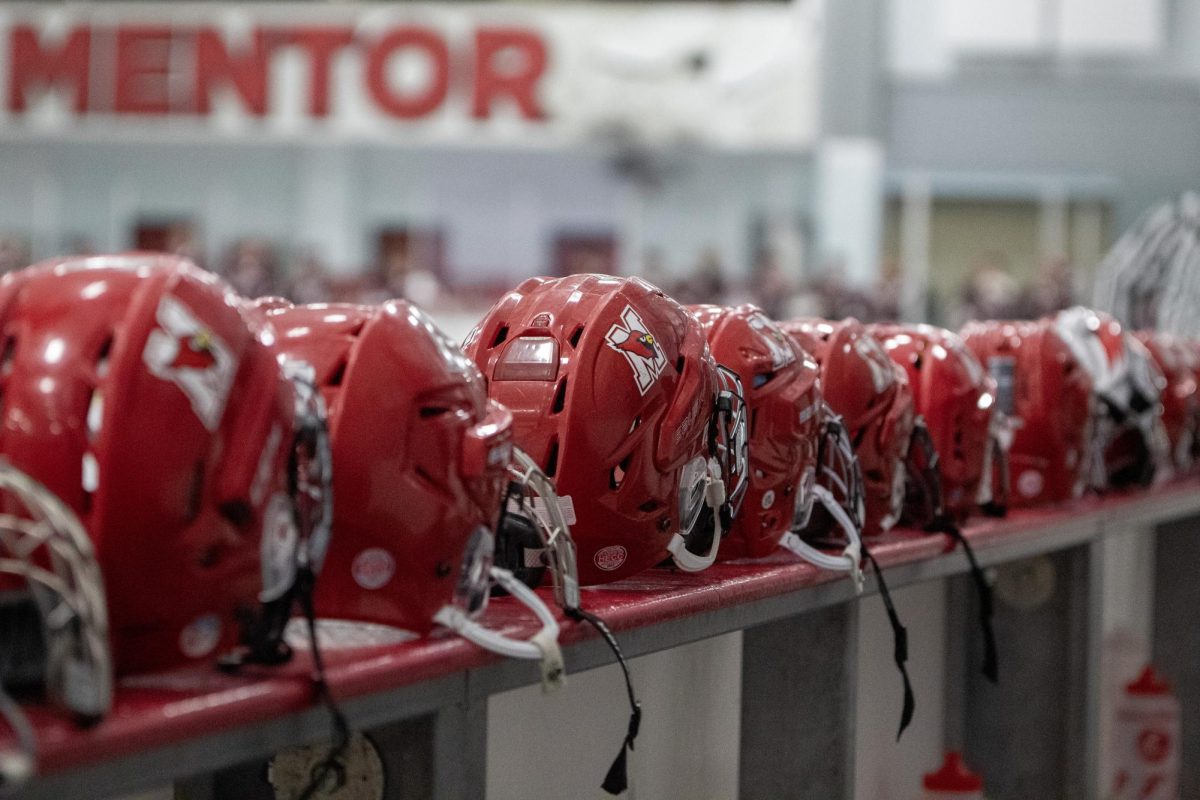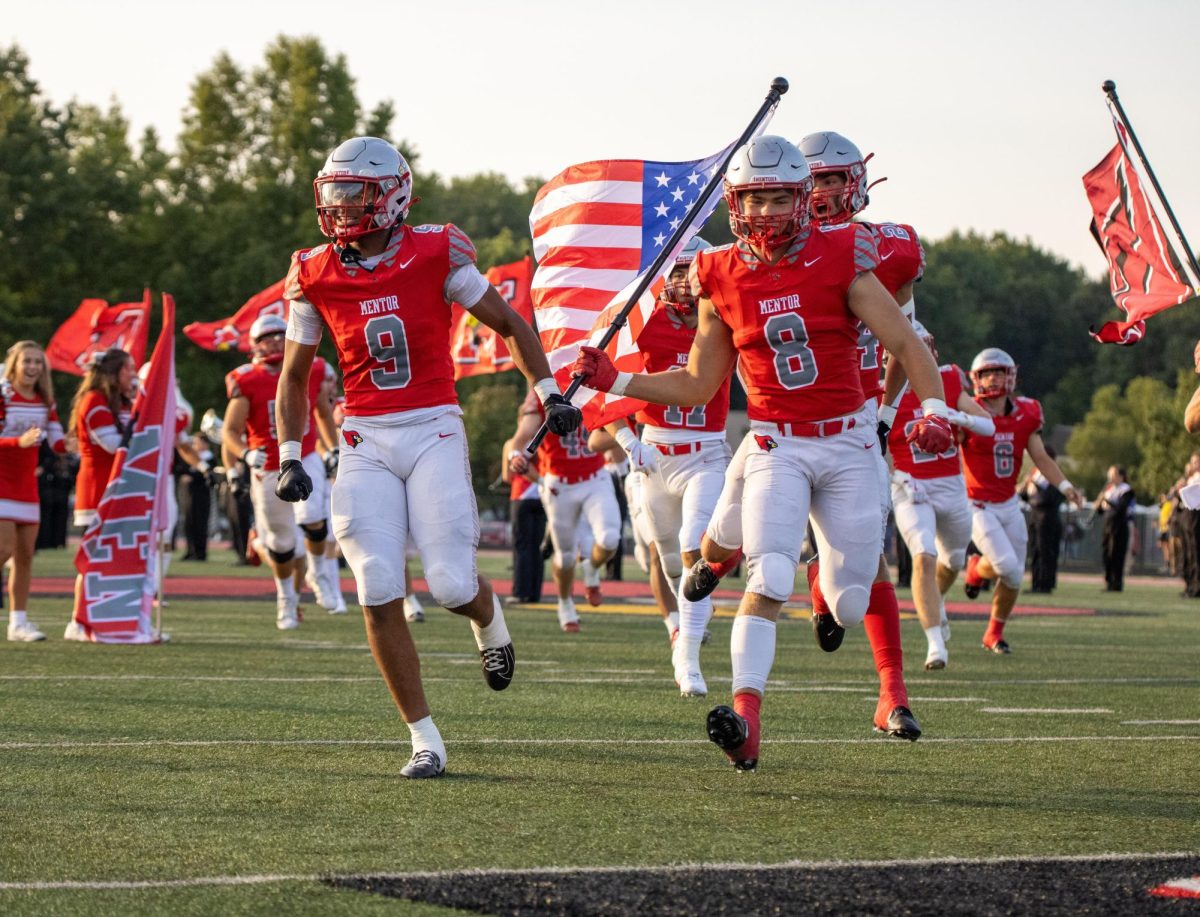Meet Bob Zonneville of the Mentor Military Signing Ceremony
Mentor’s Bob Zonneville speaks about a long-life well lived, and specifically his World War II service.
Bob Zonneville was a World War II veteran and is one of three men to have their name attached to our school military signing ceremony.
May 10, 2022
Cardinal Nation had the pleasure of interviewing Bob Zonneville, a decorated World War II veteran and Mentor resident. His name is one of three that are named as part of Mentor High School’s annual mlitary signing program, where students publicly commit to military service after graduation. The program was started in the 2012-2013 school year. It was created to honor our students who make the decision to enter the military.
“A former superintendent wanted to find a way to support our military and our students and worked with Mr. Zonneville and the other founders, Mr. Bud Spreng and Mr. Doug Koman,” Principal Jason Crowe tells us. “Students who are enlisting into a branch of the military gather with their families and friends are invited along with their recruiter or someone who represents their branch of the military to speak about the student. Typically the speeches center on why the student wants to enter the military, what they will be training for and doing when they enter service and background on the student.”
Because Mr. Zonneville is one of the three veterans mentioned in our program, we thought you might like to hear from him yourself.
Cardinal Nation: What was life like you for you when growing up in the 1920s and 1930s?
Bob Zonneville: It was a lot different. When I was first growing up we had a farm and we did not have electricity or indoor plumbing or anything in the 1920s and 1930s. It was different. Of course I am not saying it was better, but it was different. When the Great Depression hit, most people were hurting. My father was from Holland so I was the first one born here. Of course the nation was so much smaller. When I was born there were around 100 million people and today there are 300 million. Things have changed so much in part because of the population change. Also we were still heavily in the agricultural age. Things were not better or worse but they were just different.
Cardinal Nation: Was going into the military something you always thought you would do?
Bob Zonneville: I was a Senior in High School when Japan attacked Pearl Harbor on December 7th. I knew then I would probably wind up in the military. I might have been exempt because farmers were exempt. But when your country is attacked and you are younger you want to go fight for your country. If we were attacked today I do not think we would have done anything different. I enlisted right after I graduated because I had to wait a couple months until I was eighteen. But I don’t think we would do anything different than we did if we were being attacked today. Before we judge, people forget about the circumstances.
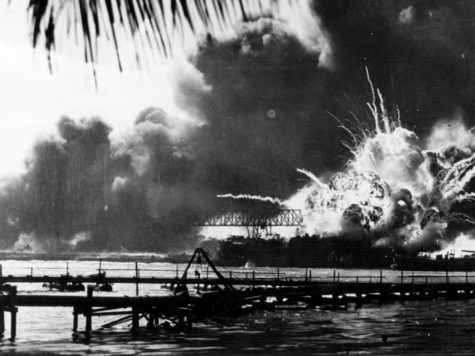
Cardinal Nation: Was the being in the military exactly like how you pictured it?
Bob Zonneville: I do not think there was any way of picturing it. The military was different, too, because prior to being attacked in 1940’s we probably had less than 300,000 in the army and the army grew to 8.5 million in a short time. So the training was shortened. My basic training was 13 weeks. They had to get you ready in a hurry. So the military itself changed a lot. For an armed force that didn’t even have half a million grew to 16.2 million. So when things happened so fast no one could have pictured it. Besides for the remaining World War I people, no one knew what real war was. In our country we had an outside country attack and here we are being hit from two sides: Europe and the Pacific.
Cardinal Nation: What struggles did you face as a serviceman overseas?
Bob Zonneville: I do not think you can be prepared for what could happen. I went to a school [after the war] and all the kids wanted to know how it was like to live in a foreign country. I really didn’t live there – I fought there. So all the time we spent with the residents was minimal. You live there yet you really don’t live there. I do not know if I had any real trouble. After basic training they gave us a test and I was told I had a high IQ and was told I could go to New York for college and become an engineer. A month and a half later I arrived on a boat to Europe and after we got into France after my first real battle and we had a break for a minute. I thought to myself, what was I getting into? And now I was there I was going to be there because there’s no way of getting out of it except getting wounded or the war ending. We did not have tours in those days. You were there until the war was over. At the time I had no clue how long.
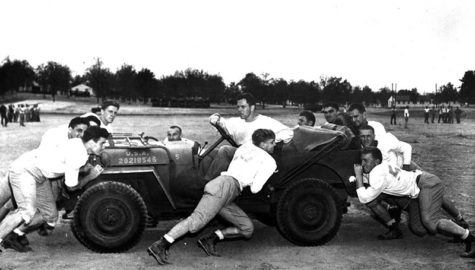
Cardinal Nation: When and where did you serve and how did you think about it at the time?
Bob Zonneville: I served in Northern Ireland, Normandy, Belgium, Luxembourg, Holland, and Germany. There is no way to be prepared for what you were being faced with. When you are on the front line that’s just how you live. You are almost like an animal. You sleep on the ground. The food comes from a small box. You go a day without a shower or even a change of clothes. It is a different existence. So you don’t hear a lot of complaining. War is bad but you do not take it as bad when your country is attacked. There is also big moral support from home. Wars after in Korea, Vietnam, Afghanistan or Iraq (were) our choice. Not everyone agrees but at least we had a lot of moral support from home.
Bob Zonneville Interview Part 2
Cardinal Nation: How much do you think your service of 75 years ago defines you today?
Bob Zonneville: For me I learned I couldn’t do it alone – showed me I had to work and depend on others because when you’re fighting to survive it is probably because someone else did not survive. The division before the war had 100% casualties. I think it changed my opinion when I went into management. I think I did a good job delegating. Everyone makes mistakes even without knowing it.
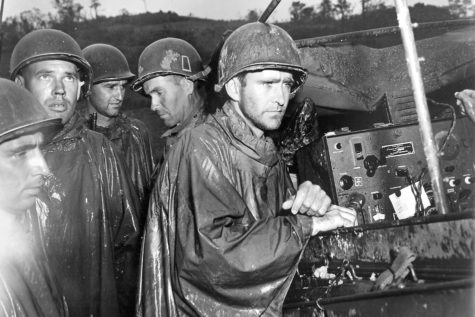
Cardinal Nation: What is the most important thing for students today to understand about that time period?
Bob Zonneville: A lot of people do not like to talk about but it is a part of our history. Unfortunately they are critical of the younger generation when the younger generation really does want to know. Second part is there’s no way to describe what it really is like when you are faced with your life constantly. I was in Europe from June of ‘44 to the end of May ‘45. I can’t remember a day I didn’t fear for my life. So I don’t know what’s really any way you can relate this to the other generation you can tell them. A movie called “Saving Private Ryan” came out. One of my children asked if it was really that bad. No, it is ten times worse because you do not hear the sounds and see the pain.
Cardinal Nation: What have your experiences been like working with students and why do you think it’s so important to talk about this and bring awareness to the time period?
Bob Zonneville: When I came back from the war I did not want to talk about it but then I had children and they found stuff around the house. My kids’ teacher then called me into talk to the class and I did it since it was for my kids. I think in order to prevent another world war we need talk about it.
Cardinal Nation: Why is the military signing ceremony important and how do you feel about having your name on it?
Bob Zonneville: I’m honored by my name being there. I think it’s a wonderful program. I think it’s so important that we should never forget that 1% of our population is serving. And if we get in a real battle they have to protect us.
Bob Zonneville Interview Part 3
Cardinal Nation: How did you earn various awards?
Bob Zonneville: I do not put the same emphasis on the award since it was difficult to get an award back in time of war due to the large numbers enlisted and high casualties. I was lucky to receive several awards even though many other people’s acts went unnoticed. In modern times they give out a lot of medals to encourage those in the service.
Cardinal Nation: What awards and medals did you earn?
Bob Zonneville: I got the Combat Infantryman Badge, two Purple Hearts, and Bronze Stars. The French gave me the Legion of Honor, their country’s highest award. I served in all four main campaigns. I got some awards from the state of New York where I am from.
Cardinal Nation: What would you give to someone who’s interested in going into the service?
Bob Zonneville: The advice I would give you as a student is in school, whatever you are doing in this world, do your best and never give up. Show up and do your best. I have a large family. My daughter was an A student and my oldest son was a C student. I didn’t expect the same thing from them. I expect you to do your best. I never give up respect for others’ answers. I came from a very modest family. I never went to college up to where I put my choice from that modest beginning. I became president and CEO of a million-dollar company. I don’t think I ever cheated anybody on my work site. You still have to be there so might as well put in 110%.

